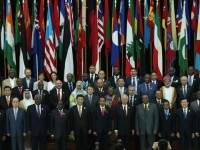Vasilis Trigkas, Visiting Assistant Professor, Schwarzman College, Tsinghua University
Apr 30, 2015
The term “Chimerica,” is liberal theorizing that assumes the more economically interdependent the U.S. and China become, the more peaceful the hegemonic transition of power will be. Realists theorize that there is ongoing comprehensive balancing, from trade to militarization, and free trade alone will not solve deep ideological and system differences. Improved relations require increased participation and less inequality on both sides of the Pacific.
Minxin Pei, Tom and Margot Pritzker ’72 Professor of Government , Claremont McKenna College
Apr 30, 2015
The U.S. state visit by Japanese Prime Minister Shinzo Abe will be remembered not only because few foreign leaders have been privileged to address a joint session of Congress, but for the strengthening of the U.S.-Japan alliance. Neither Washington nor Tokyo should explicitly link a more robust U.S.-Japan relationship with deterrence against China’s rise.
Brahma Chellaney, Professor, Center for Policy Research
Apr 29, 2015
Japan’s Constitution hasn’t been changed in 68 years, and prevents its military from staging rescue missions and other overseas operations. Brahma Chellaney encourages Japanese constitutional reform, with U.S. support, to act as a military balance in East Asia.
Ted Galen Carpenter, Senior Fellow, Randolph Bourne Institute
Apr 29, 2015
A key component of Washington’s military rebalancing strategy is improving its relationship with Japan. However, actions by Abe and some close associates reinforce suspicions of the attempt to legitimize imperialism through revised textbooks, visits by the PM to the Yasukuni Shrine, and reluctance to accept the history of “comfort women.”
Ben Reynolds, Writer and Foreign Policy Analyst in New York
Apr 27, 2015
Hilary Clinton’s established perspective on U.S.-China relations as the face of the “Pivot to Asia,” does not bod well for the bilateral relationship, writes Ben Reynolds. The existing Clinton ties with the Center for New America Security (CNAS), a hawkish, pro-interventionist think tank, further the claim that U.S. militaristic hegemony will continue to be the foreign policy toward China.

Chen Xiangyang, Director and Research Professor, CICIR
Apr 26, 2015
The Asian African Summit in Jakarta, Indonesia opened on April 22nd carrying the “Bandung Spirit” of solidarity and common will to fight against colonialism, strive for national independence, safeguard world peace, and promote friendly relations among themselves – all of which challenge existing international relations norms and apply to the developing world today.
Stephen Harner, Former US State Department Official
Apr 22, 2015
The Obama administration’s “rebalance to Asia” policy launched in 2010 has turned toward militaristic power-based containment rather than engagement. The Council of Foreign Relations has suggested that the U.S. boost military budgets with its allies, and diminish trade with China, a dangerous and misguided strategy that resembles Cold War tactics.
Kevin Rudd, Former Prime Minister of Australia
Apr 22, 2015
Former Australian Prime Minister Kevin Rudd has emerged as a key broker of perceptions between the U.S. and China. On behalf of the Belfer Center at Harvard, he has just completed a seminal report "U.S.-China 21: The Future of U.S.-China Relations Under Xi Jinping.
Zhou Bo, Senior Fellow, Center for International Security and Strategy, Tsinghua University
Apr 21, 2015
China’s growing involvement in Sri Lanka and South Asia, drew Prime Minister Narendha Modi to visit Sri Lanka, the first for an Indian PM in 27 years. India’s utmost concern is security with China’s so-called “string of pearls” strategy, which though coined by a U.S. defense contractor, suspects China of building naval bases in the Indian Ocean. To ease tension, the two countries must accommodate each other’s maritime interests.
Feng Zhaokui, Honorary Academician, Chinese Academy of Social Sciences
Apr 21, 2015
The Japanese government pinned high hopes on the “three arrows” of fiscal reform, eager to suppress the deflation that has haunted the country for about a decade. But the moves haven’t solved key problems, including its aging and shrinking population. While the “third arrow” sent a clear signal for reforms and involved a wide range of sectors, the lack of real innovation in Abenomics has so far meant limited results.
Back to Top

- China-US Focus builds trust and understanding between the U.S. and China through open dialogue among thought leaders.
- Our Offerings
- Topics
- Videos
- Podcasts
- Columnists
- Research Reports
- Focus Digest
- Stay Connected
-
Thanks for signing up!
- Get the latest stories from China-US Focus weekly.